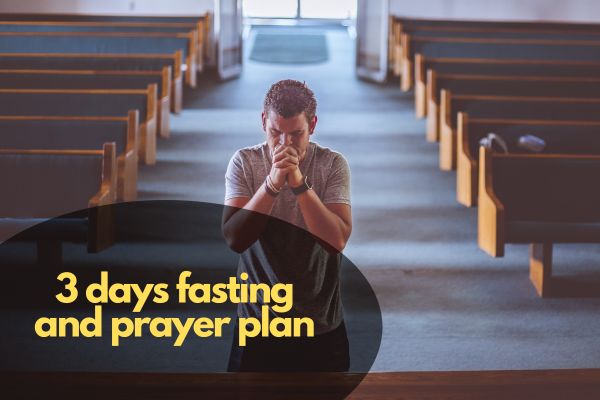Table of Contents Show
The practice of fasting and prayer has been a significant spiritual discipline observed by various religious traditions for centuries. It is a time of self-reflection, inner growth, and deepening one’s connection with a higher power. One popular approach to fasting and prayer is the three-day fasting and prayer plan, which involves abstaining from food and dedicating oneself to prayer for a consecutive three-day period. This article explores the benefits and considerations of such a plan, providing guidance and insights for individuals seeking to embark on this spiritual journey.
3 Days Fasting And Prayer Plan
During a three-day fasting and prayer plan, participants experience physical, mental, and spiritual transformations. The act of fasting allows the body to cleanse and detoxify, leading to increased energy, improved mental clarity, and enhanced spiritual receptivity. In this article, we will explore a comprehensive guide to help you embark on a meaningful and transformative 3-day fasting and prayer journey.
Preparation and Reflection
Before starting your fasting and prayer plan, it is crucial to prepare your mind, body, and spirit. Begin by setting your intention for the three days, whether it is seeking guidance, surrendering personal struggles, or expressing gratitude. Reflect on your spiritual goals and the areas of your life that require attention and growth.
During this day, gradually reduce your food intake by consuming lighter, nourishing meals. Stay hydrated and focus on consuming foods that are easy to digest. This step will help your body adjust to the fasting period and minimize discomfort.
Allocate dedicated time for prayer and meditation. Engage in quiet contemplation, read religious texts, or listen to spiritual teachings that resonate with you. This will enable you to center yourself and cultivate a receptive mindset for the days ahead.
Deepening Your Connection
On the second day of your fasting and prayer plan, you will deepen your connection with your spiritual self and the divine. As you abstain from food, your body enters a state of cleansing and detoxification. This physical detoxification often parallels a mental and emotional cleansing, allowing you to release negativity and gain clarity.
Engage in extended periods of prayer and meditation. Use this time to express your intentions, desires, and concerns to your higher power. Practice active listening, allowing yourself to be open to messages, signs, and guidance. Consider keeping a journal to record your thoughts, insights, and any revelations that arise during this process.
During the fasting period, it is crucial to maintain your energy levels and hydration. Consume plenty of water, herbal teas, and natural juices to stay nourished. If you feel weak or lightheaded, rest and prioritize self-care.
Renewal and Integration
As you approach the final day of your fasting and prayer plan, focus on renewal and integration of the insights and experiences gained during the previous days. This day is an opportunity for spiritual transformation and a reconnection with your purpose.
Spend time in gratitude, expressing appreciation for the blessings in your life. Reflect on the lessons learned during the fasting period and consider how you can apply them to your daily life moving forward. Visualize positive outcomes, set intentions, and reaffirm your commitment to personal growth and spiritual development.
Break your fast mindfully by gradually reintroducing nourishing foods. Start with light, easily digestible meals and listen to your body’s signals. Take this time to appreciate the simple act of eating and savor the flavors and nourishment that food provides.
Post-Fasting Period
After completing your 3-day fasting and prayer plan, it is essential to integrate the experience into your daily life. Maintain a consistent prayer and meditation practice to sustain your spiritual connection. Reflect on the insights gained during fasting and implement positive changes in your life accordingly.
Tips for a Successful Fasting and Prayer Experience
Here are some tips for a successful fasting and prayer experience:
Stay Hydrated: Drink an adequate amount of water throughout the day to prevent dehydration. Water helps regulate bodily functions and supports energy production. Consider adding a slice of lemon or cucumber to enhance the flavor and provide a refreshing boost.
Set Clear Intentions and Goals: Clearly define why you are undertaking the fasting and prayer plan. Whether it’s for spiritual growth, clarity, or a specific goal, having a clear intention will guide your journey.
Mental and Spiritual Preparation: Take time before the fast to mentally and spiritually prepare. Engage in meditation, reflection, and prayer to align your mindset with the purpose of the fast.
The Role Of Faith In Fasting
Faith plays a significant role in fasting, as it provides the spiritual foundation and motivation for the practice. Fasting is deeply rooted in many religious traditions and is often seen as an act of devotion and obedience to a higher power. Here are some key aspects of the role of faith in fasting:
Spiritual Connection: Fasting is a way to deepen one’s spiritual connection with the divine. It is an opportunity to draw closer to a higher power, seek guidance, and cultivate a sense of reverence and awe. Faith in a higher power provides the framework for this connection, as believers engage in fasting with the belief that it will bring them closer to their spiritual aspirations.
Discipline and Self-Control: Fasting requires discipline and self-control, and faith provides the motivation and strength to adhere to the fasting practice. It is through faith that individuals find the resolve to abstain from food and other desires during the designated fasting period. The belief in the spiritual benefits of fasting serves as a powerful incentive to overcome physical and mental challenges.








